|
It's only natural that Marty Cooper and Jack Nitzsche,
two eager-to-learn white guys with a love of music and based in the
r'n'b/pop melting pot that was Hollywood at the time, should find
themselves working together. That their first collaboration should
be an instrumental was most apt; a genre that would soon provide one
of the pair's biggest selling and most enduring compositions, "The
Lonely Surfer".
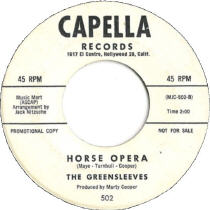 In
late 1960 Marty Cooper founded his first record label, Capella. The
first release was The Ineligibles "Do The Groove"/"Just The Things
That You Do", Capella 501. There will be more on this later but, jumping
the gun, the next 45, Capella 502, was released in January 1961. Released
by a studio group dubbed The Greensleeves, the cuts were a re-working
of "Greensleeves" adapted by Maye, Turnbull and Cooper, and "Horse
Opera" written by the trio. The arranger on the session, one of his
first, was Jack Nitzsche. "By the time Jack was signed for
his first session we had been hanging out for a long time. He was
married, I was single and I spent a lot of time with Jack and his
wife Gracia." "Greensleeves" is a rocking take of the old
English folk tune written by a former king of England, Henry VIII.
This and the b-side "Horse Opera" are strong tunes with bluesy rocking
beats. It was a goodie, but sales were marginal, and apparently no
further releases appeared on the label. Cooper on the credits is obvious,
Turnbull is discussed later, but I would love to know more on the
identity of 'Maye'. Could it be Gracia Nitzsche using her maiden name,
May(e)? In
late 1960 Marty Cooper founded his first record label, Capella. The
first release was The Ineligibles "Do The Groove"/"Just The Things
That You Do", Capella 501. There will be more on this later but, jumping
the gun, the next 45, Capella 502, was released in January 1961. Released
by a studio group dubbed The Greensleeves, the cuts were a re-working
of "Greensleeves" adapted by Maye, Turnbull and Cooper, and "Horse
Opera" written by the trio. The arranger on the session, one of his
first, was Jack Nitzsche. "By the time Jack was signed for
his first session we had been hanging out for a long time. He was
married, I was single and I spent a lot of time with Jack and his
wife Gracia." "Greensleeves" is a rocking take of the old
English folk tune written by a former king of England, Henry VIII.
This and the b-side "Horse Opera" are strong tunes with bluesy rocking
beats. It was a goodie, but sales were marginal, and apparently no
further releases appeared on the label. Cooper on the credits is obvious,
Turnbull is discussed later, but I would love to know more on the
identity of 'Maye'. Could it be Gracia Nitzsche using her maiden name,
May(e)?
Although it's proved impossible to accurately date, I'd assume the
next Cooper - Nitzsche collaboration was "Salvation City" by a studio
'band', modestly named The Cooperstown Volunteer Band. Pressed on
another Marty Cooper label, Interlude Records, this appears to have
been the only release. Not only that but the few records I know of
featured the same track on both sides. (Naturally, any more information
on this or any of the other records mentioned is eagerly sought.)
Utilizing part of the tune from "Horse Opera", the take is very different
but equally as good. Big drums, trombones, trumpets, and horns, sounds
like, in fact it is, a brass band or, as it is termed in the US, a
marching band. It may not seem a recipe for chart action but if more
people had heard the tune it sounds to me like it could have been.
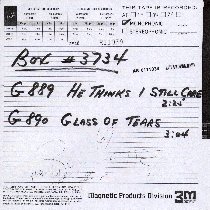 The
next 45 to bear the Cooper - Nitzsche credit was a vocal, Sherrell
Townsend's "He Thinks I Still Care" on Gone Records. One of the first
'obscure' Nitzsche records I bought and I was blown away. The song,
written by Dickey Lee Lipscomb, was a big country hit for George Jones
and fast became something of a country classic. There have been many
releases of the song but surely none compare to Sherrell's version.
Sherrell, possessing one of those voices that sucks you in and spits
you out spent, imbues the song with longing and passion. Thanks to
Westside Records and compilers Mick Patrick and Malcolm Baumgart,
the track is available on the CD "Girls Will Be Girls - Vol. 1". When
compiling the CD, Mick was able to not only 'cop a look' at the tracks
master-tapes but to scan the box and accompanying note from Marty
to Gone Records head honcho, George Goldner. He's kindly shared these
bits of esoteric paraphernalia with the site. The b-side to "He Thinks..."
has also been re-released on Westside's double CD "George Goldner
Presents The Gone Story: Doo-Wop To Soul 1957-1963". The song "Glass
Of Tears", a bluesy run-through with little of the arranging magic
heard on the a-side, is one of only two compositions that I know of
to feature a BERNARD Nitzsche credit. The
next 45 to bear the Cooper - Nitzsche credit was a vocal, Sherrell
Townsend's "He Thinks I Still Care" on Gone Records. One of the first
'obscure' Nitzsche records I bought and I was blown away. The song,
written by Dickey Lee Lipscomb, was a big country hit for George Jones
and fast became something of a country classic. There have been many
releases of the song but surely none compare to Sherrell's version.
Sherrell, possessing one of those voices that sucks you in and spits
you out spent, imbues the song with longing and passion. Thanks to
Westside Records and compilers Mick Patrick and Malcolm Baumgart,
the track is available on the CD "Girls Will Be Girls - Vol. 1". When
compiling the CD, Mick was able to not only 'cop a look' at the tracks
master-tapes but to scan the box and accompanying note from Marty
to Gone Records head honcho, George Goldner. He's kindly shared these
bits of esoteric paraphernalia with the site. The b-side to "He Thinks..."
has also been re-released on Westside's double CD "George Goldner
Presents The Gone Story: Doo-Wop To Soul 1957-1963". The song "Glass
Of Tears", a bluesy run-through with little of the arranging magic
heard on the a-side, is one of only two compositions that I know of
to feature a BERNARD Nitzsche credit.
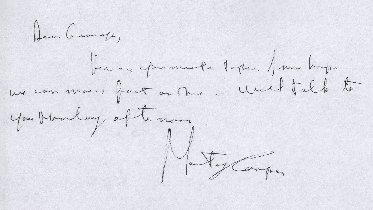 " Dear George, Here are your master tapes. I sure hope we can move fast on this - until I talk to you Monday afternoon, Marty Cooper" 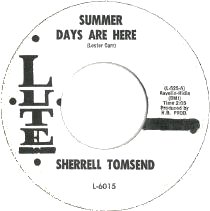 Next
up was a dance number entitled "The Cinnamon Cinder", named after
a popular nightclub of the day and written by a friend and associate
of Marty's, Russ Regan. Gathering a group of LA's finest in the studio,
the names of which are lost in the mists of time, the 45 was released
with high hopes on the mainstream Warner Brothers label. The Pastel
Six soon dashed Marty's assumption that he had an exclusive on the
song when Russ released his own version. The Cinders is a good record
but for my taste just a bit too 'polite'. The Pastel Six's rougher,
live sound won the chart battle. Flip the Cinders 45 over though and
here on a Cooper - Nitzsche composition "C'mon Wobble" you do get
a tougher more meaty side. I'm not sure if both tracks were laid down
at the same time with the same personnel but on this side Darlene
Love's wailing can be easily enjoyed. Marty does recall some of the
session:"C'mon Wobble. Don't know the personnel but I do remember
that I had the brilliant idea to use two drummers. Jack couldn't see
it at all but called them anyway and of course he was right. It was
stupid." Next
up was a dance number entitled "The Cinnamon Cinder", named after
a popular nightclub of the day and written by a friend and associate
of Marty's, Russ Regan. Gathering a group of LA's finest in the studio,
the names of which are lost in the mists of time, the 45 was released
with high hopes on the mainstream Warner Brothers label. The Pastel
Six soon dashed Marty's assumption that he had an exclusive on the
song when Russ released his own version. The Cinders is a good record
but for my taste just a bit too 'polite'. The Pastel Six's rougher,
live sound won the chart battle. Flip the Cinders 45 over though and
here on a Cooper - Nitzsche composition "C'mon Wobble" you do get
a tougher more meaty side. I'm not sure if both tracks were laid down
at the same time with the same personnel but on this side Darlene
Love's wailing can be easily enjoyed. Marty does recall some of the
session:"C'mon Wobble. Don't know the personnel but I do remember
that I had the brilliant idea to use two drummers. Jack couldn't see
it at all but called them anyway and of course he was right. It was
stupid."
| Letter from Scott Turner |
|---|
Jack was one of my closest friends ever and I was saddend to hear of his passing. I never saw him without a smile on his face.
Y'know I have no idea who 'Maye' is...possibly the original (British) writer of Greensleeves...or it may be Gracia.
RE: Jamie Horton ("My Little Marine" was her big one) I was with Guy Mitchell at the time, managed by Eddie Joy in N.Y.C. (Noyawsic). I convinced Eddie to fly Jack into N.Y. to manage the Jamie session. He was reluctant at first but was overjoyed (no pun intended) with the results.
Good luck with your project. No one deserves it more than Jack.
Sincerley,
Scott Turner
|
Another instrumental followed the Cinders' 45. The artist, or I suppose
more accurately the duet, was the intriguingly named Bernardo Martini.
You don't need to be the brains of Britain to work out that Bernard(o)
is Nitzsche and Martin(i) is Cooper. As well as arranging and producing,
they co-wrote the b-side, "Silver Dust". And what do you know? It's
the third take of "Horse Opera" - "Salvation City". It's a strong
tune, so the pair can't be faulted for sticking with it. This time,
as is the flip, it was arranged as a cowboy-western theme. The a-side,
"Ghost Town", was a solo Turnbull tune and it is not hard to imagine
it booming out from the big screen's speakers as John Wayne rides
into a deserted shanty town. Graham Morrison Turnbull, aka Scott Turner*1,
was by this time, the early sixties, well established as a writer.
He was a musician and prolific writer either solo or in partnership
with Herb Albert, Harry Nillson and many others. "Greensleeves"
and Bernardo Martini were not the only Turnbull - Nitzsche collaborations.
He wrote "Chivaree" and its flip, "Tell Your Story Walkin'", both
tunes arranged by Jack for another instrumental studio group, the
Crab Creek County High School Band. Lee Hazlewood produced this single
for Old Town. Scott Turner wrote a tune with Jack called "Go Shout
It From A Mountain" which was released by Jamie Horton on Joy. Jack
also arranged the cut but the song is not one of the pair's strongest.
When I began my research on this article I dropped Mr. Scott Turner
a line. I'm delighted he took the time to reply. His letter is re-printed
on the right.
Jack and Marty had so far collaborated on five recordings. The sixth,
in 1963, was just as different from the previous five as they were
from each other. Another instrumental, another studio group, this
time the interestingly named Edgar Alan and the Po' Boys. It was another
LA recording studio, although this time the tracks were licensed to
the main east coast subsidiary of Laurie, Rust Records, and it was
another new sound. "Panic Button" wasn't the horror that might have
been expected, a drum-intro mid-tempo dance number, cool handclaps,
plucked mandolin strings and groovy beat. Best heard at the 'Go-Go'
club, wearing your diamond-patterned polyester sweater, grooving on
the dance floor but still carefully nursing your dry Martini and lemonade.
"Lenore" on the other side is a slow and bluesy honky-tonk piano based
jazz workout. Best heard late at night, in a sleazy nightclub, bourbon
in one hand, dame on the other studiously wiping away your tears.
Marty Cooper and Jack Nitzsche were working well together but the
best was still to come.
*1Scott Turner's career in music from his early compositions for Slim Whitman and Tommy Sands to working with Buddy Holly, Herb Alpert, Audie Murphy et al. makes for a fascinating story and some great music. You can now hear Scott narrating his story, some songs never previously released and some rare photos. Twenty-one 90-minute cassette tapes are available from the Music Morsel web site.
|
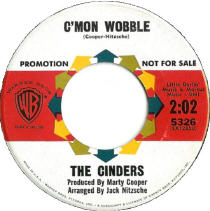
 "Dear George, Here are your master tapes. I sure hope we can move fast on this - until I talk to you Monday afternoon, Marty Cooper"
"Dear George, Here are your master tapes. I sure hope we can move fast on this - until I talk to you Monday afternoon, Marty Cooper" (Part 1)
(Part 1) (Part 3)
(Part 3)  In
late 1960 Marty Cooper founded his first record label, Capella. The
first release was The Ineligibles "Do The Groove"/"Just The Things
That You Do", Capella 501. There will be more on this later but, jumping
the gun, the next 45, Capella 502, was released in January 1961. Released
by a studio group dubbed The Greensleeves, the cuts were a re-working
of "Greensleeves" adapted by Maye, Turnbull and Cooper, and "Horse
Opera" written by the trio. The arranger on the session, one of his
first, was Jack Nitzsche. "By the time Jack was signed for
his first session we had been hanging out for a long time. He was
married, I was single and I spent a lot of time with Jack and his
wife Gracia." "Greensleeves" is a rocking take of the old
English folk tune written by a former king of England, Henry VIII.
This and the b-side "Horse Opera" are strong tunes with bluesy rocking
beats. It was a goodie, but sales were marginal, and apparently no
further releases appeared on the label. Cooper on the credits is obvious,
Turnbull is discussed later, but I would love to know more on the
identity of 'Maye'. Could it be Gracia Nitzsche using her maiden name,
May(e)?
In
late 1960 Marty Cooper founded his first record label, Capella. The
first release was The Ineligibles "Do The Groove"/"Just The Things
That You Do", Capella 501. There will be more on this later but, jumping
the gun, the next 45, Capella 502, was released in January 1961. Released
by a studio group dubbed The Greensleeves, the cuts were a re-working
of "Greensleeves" adapted by Maye, Turnbull and Cooper, and "Horse
Opera" written by the trio. The arranger on the session, one of his
first, was Jack Nitzsche. "By the time Jack was signed for
his first session we had been hanging out for a long time. He was
married, I was single and I spent a lot of time with Jack and his
wife Gracia." "Greensleeves" is a rocking take of the old
English folk tune written by a former king of England, Henry VIII.
This and the b-side "Horse Opera" are strong tunes with bluesy rocking
beats. It was a goodie, but sales were marginal, and apparently no
further releases appeared on the label. Cooper on the credits is obvious,
Turnbull is discussed later, but I would love to know more on the
identity of 'Maye'. Could it be Gracia Nitzsche using her maiden name,
May(e)? The
next 45 to bear the Cooper - Nitzsche credit was a vocal, Sherrell
Townsend's "He Thinks I Still Care" on Gone Records. One of the first
'obscure' Nitzsche records I bought and I was blown away. The song,
written by Dickey Lee Lipscomb, was a big country hit for George Jones
and fast became something of a country classic. There have been many
releases of the song but surely none compare to Sherrell's version.
Sherrell, possessing one of those voices that sucks you in and spits
you out spent, imbues the song with longing and passion. Thanks to
Westside Records and compilers Mick Patrick and Malcolm Baumgart,
the track is available on the CD "Girls Will Be Girls - Vol. 1". When
compiling the CD, Mick was able to not only 'cop a look' at the tracks
master-tapes but to scan the box and accompanying note from Marty
to Gone Records head honcho, George Goldner. He's kindly shared these
bits of esoteric paraphernalia with the site. The b-side to "He Thinks..."
has also been re-released on Westside's double CD "George Goldner
Presents The Gone Story: Doo-Wop To Soul 1957-1963". The song "Glass
Of Tears", a bluesy run-through with little of the arranging magic
heard on the a-side, is one of only two compositions that I know of
to feature a BERNARD Nitzsche credit.
The
next 45 to bear the Cooper - Nitzsche credit was a vocal, Sherrell
Townsend's "He Thinks I Still Care" on Gone Records. One of the first
'obscure' Nitzsche records I bought and I was blown away. The song,
written by Dickey Lee Lipscomb, was a big country hit for George Jones
and fast became something of a country classic. There have been many
releases of the song but surely none compare to Sherrell's version.
Sherrell, possessing one of those voices that sucks you in and spits
you out spent, imbues the song with longing and passion. Thanks to
Westside Records and compilers Mick Patrick and Malcolm Baumgart,
the track is available on the CD "Girls Will Be Girls - Vol. 1". When
compiling the CD, Mick was able to not only 'cop a look' at the tracks
master-tapes but to scan the box and accompanying note from Marty
to Gone Records head honcho, George Goldner. He's kindly shared these
bits of esoteric paraphernalia with the site. The b-side to "He Thinks..."
has also been re-released on Westside's double CD "George Goldner
Presents The Gone Story: Doo-Wop To Soul 1957-1963". The song "Glass
Of Tears", a bluesy run-through with little of the arranging magic
heard on the a-side, is one of only two compositions that I know of
to feature a BERNARD Nitzsche credit. Next
up was a dance number entitled "The Cinnamon Cinder", named after
a popular nightclub of the day and written by a friend and associate
of Marty's, Russ Regan. Gathering a group of LA's finest in the studio,
the names of which are lost in the mists of time, the 45 was released
with high hopes on the mainstream Warner Brothers label. The Pastel
Six soon dashed Marty's assumption that he had an exclusive on the
song when Russ released his own version. The Cinders is a good record
but for my taste just a bit too 'polite'. The Pastel Six's rougher,
live sound won the chart battle. Flip the Cinders 45 over though and
here on a Cooper - Nitzsche composition "C'mon Wobble" you do get
a tougher more meaty side. I'm not sure if both tracks were laid down
at the same time with the same personnel but on this side Darlene
Love's wailing can be easily enjoyed. Marty does recall some of the
session:"C'mon Wobble. Don't know the personnel but I do remember
that I had the brilliant idea to use two drummers. Jack couldn't see
it at all but called them anyway and of course he was right. It was
stupid."
Next
up was a dance number entitled "The Cinnamon Cinder", named after
a popular nightclub of the day and written by a friend and associate
of Marty's, Russ Regan. Gathering a group of LA's finest in the studio,
the names of which are lost in the mists of time, the 45 was released
with high hopes on the mainstream Warner Brothers label. The Pastel
Six soon dashed Marty's assumption that he had an exclusive on the
song when Russ released his own version. The Cinders is a good record
but for my taste just a bit too 'polite'. The Pastel Six's rougher,
live sound won the chart battle. Flip the Cinders 45 over though and
here on a Cooper - Nitzsche composition "C'mon Wobble" you do get
a tougher more meaty side. I'm not sure if both tracks were laid down
at the same time with the same personnel but on this side Darlene
Love's wailing can be easily enjoyed. Marty does recall some of the
session:"C'mon Wobble. Don't know the personnel but I do remember
that I had the brilliant idea to use two drummers. Jack couldn't see
it at all but called them anyway and of course he was right. It was
stupid."